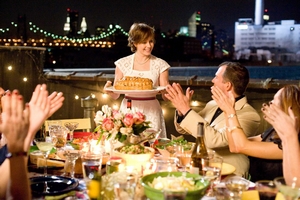Mark:
In their second pairing after the huge critical success of 2008’s Doubt, Amy Adams and Meryl Streep square off as Julie and Julia in Nora Ephron’s double biopic. Julia Child is perhaps the best-known of all American television chefs, while Julie Powell shot to prominence thanks to her wildly successful 2002 blog in which she described her attempt to cook all 524 recipes in Child’s seminal work in 365 days.
Julie and Julia is told as two separate stories, one intercut with the other to enhance the comparison between the lead characters. Child has just arrived in Paris with her husband, and is finding the life of a diplomat’s wife incredibly dull. Her love of French food encourages her to attend cooking classes at Le Cordon Bleu, and eventually to commence work on the collaboration that will become her magnum opus, ‘Mastering the Art of French Cooking’. Meanwhile, Julie is answering phones in a call centre dealing with the aftermath of the 9/11 attacks and the trauma of her fellow New Yorkers. Her dissatisfaction in life is relieved only when cooking or watching old episodes of Child’s television series, prompting her to undertake her massive task.
Her love of French food encourages her to attend cooking classes at Le Cordon Bleu, and eventually to commence work on the collaboration that will become her magnum opus, ‘Mastering the Art of French Cooking’. Meanwhile, Julie is answering phones in a call centre dealing with the aftermath of the 9/11 attacks and the trauma of her fellow New Yorkers. Her dissatisfaction in life is relieved only when cooking or watching old episodes of Child’s television series, prompting her to undertake her massive task.
For much of the film the two biopics sit together reasonably comfortably, with obvious parallels between the women and their experiences enhanced by their direct juxtaposition. There are times, however, when one story cries out for more attention and the sensation one experiences on switching focus is one of loss. The balance between story threads in films that attempt this form of narrative is crucial, and with only two stories in this film, any imbalance is acutely felt.
Adams has become the go-to girl for any director wanting an actor with alternative cred and non-traditional beauty, and she builds on that reputation in this film. Julie is often self-obsessed and difficult to live with, and yet Adams brings to life the struggle of the unpublished writer in a sympathetic performance. Streep, on the other hand, has so much good work behind her in too many films to mention that she is a reliable and obvious choice for the role of Child. Her performance often threatens to swamp that of her counterpart, however, with Child almost becoming an overbearing presence.
Nora Ephron has a chequered history as writer/director, with abject failures counterposed by stunning successes like Sleepless in Seattle and When Harry Met Sally. It has taken four years for this film to arrive after the Nicole Kidman-led disaster that was 2005’s abysmal Bewitched, and perhaps Ephron took the time to consider the many and varied problems with that project before producing Julie and Julia, a film so stunningly different in both nature and quality.
It is only infrequently that Hollywood films attempt to tell the story of a strong female character, even more uncommonly that of a middle-aged character, and exceedingly rarely that one film would attempt to tell two such tales. This simple fact means that a film like Julie and Julia must be savoured, attempting as it does to bring to life the struggles of two women, flawed as they are, to succeed in their chosen fields and, more importantly, in life. That it mostly succeeds is the real joy.
Rating: